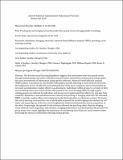Perching but not foraging networks predict the spread of novel foraging skills in starlings
Abstract
The directed social learning hypothesis suggests that information does not spread evenly through animal groups, but rather individual characteristics and patterns of physical proximity guide the social transmission of information along specific pathways. Network-based diffusion analysis (NBDA) allows researchers to test whether information spreads following a social network. However, the explanatory power of different social networks has rarely been compared, and current models do not easily accommodate random effects (e.g. allowing for individuals within groups to correlate in their asocial solving rates). We tested whether the spread of two novel foraging skills through captive starling groups was affected by individual- and group-level random and fixed effects (i.e. sex, age, body condition, dominance rank and demonstrator status) and perching or foraging networks. We extended NBDA to include random effects and conducted model discrimination in a Bayesian context. We found that social learning increased the rate at which birds acquired the novel foraging task solutions by 6.67 times, and acquiring one of the two novel foraging task solutions facilitated the asocial acquisition of the other. Surprisingly, the spread of task solutions followed the perching rather than the foraging social network. Upon acquiring a task solution, foraging performance was facilitated by the presence of group mates. Our results highlight the importance of considering more than one social network when predicting the spread of information through animal groups. This article is part of a Special Issue entitled: Cognition in the wild.
Citation
Boogert , N J , Nightingale , G F , Hoppitt , W J E & Laland , K N 2014 , ' Perching but not foraging networks predict the spread of novel foraging skills in starlings ' , Behavioural Processes , vol. 109 , no. Part B , pp. 135-44 . https://doi.org/10.1016/j.beproc.2014.08.016
Publication
Behavioural Processes
Status
Peer reviewed
ISSN
0376-6357Type
Journal article
Description
This research was supported by a Netherlands Organisation for Scientific Research Rubicon Grant to NJB, a BBSRC grant to KNL and WH (BB/D015812/1), and an ERC Advanced grant to KNL (EVOCULTURE, ref 232823).Collections
Items in the St Andrews Research Repository are protected by copyright, with all rights reserved, unless otherwise indicated.

